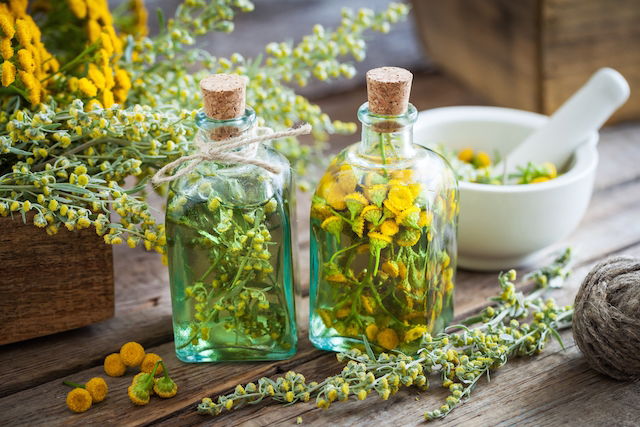Wormwood is a medicinal plant of the species Artemisia absinthium. It is rich in lactones, terpenoids, essential oils, flavonoids and phenolic compounds. It has anti-inflammatory, antioxidant, vermifuge, neuroprotective and immunomodulatory properties, and can therefore indicated to treatment ailments like a fever, intestinal worms, hepatitis, gastritis or arthritis.
The parts that are normally used of this plant are the leaves and the upper parts of the flowers, which are taken to prepare tea compresses, tinctures or fluid extracts.
Wormwood can be purchased at herbalists, natural health stores and pharmacies, and should be used under the guidance of a doctor or other medicinal plant specialist.

Health benefits
Wormwood is commonly recommended for:
- Chronic fever
- Infections caused by fungi, bacteria or intestinal parasites
- Gastritis, heartburn and indigestion
- Diarrhea
- Excess intestinal gas
- Lack of period and period cramps
- Improve immune system functioning
- Detoxify the liver
- Gallstones
- Lack of appetite or anorexia
- Arthritis and gout
- Contusion
- Depression
Wormwood has anti-inflammatory, analgesic, antioxidant, vermifuge, antimicrobial, tonic, uterine and gallbladder-stimulating, liver-protective, antidepressant and immune system-stimulating properties.
Although it has many benefits, wormwood should not replace medical treatment prescribed by your doctor, nor should it be used without guidance from a doctor or medicinal plant specialist.
How to take
Wormwood can be used in different ways depending on the shape it is in and the purpose of its use:
1. Wormwood tea
Wormwood tea can be used to help treat gallbladder problems, indigestion, loss of appetite, or intestinal problems.
Ingredients
- 1 teaspoon of dried wormwood leaves
- 1 cup of water
Directions
Boil the water, remove from heat and add the dried wormwood leaves. Cover and let it steep for about 10 minutes. Then strain, wait for it to cool and drink one cup of tea, up to 2 times a day, for a maximum of 4 weeks of treatment.
To stimulate your appetite, you are advised to drink one cup of tea before meals. For gastrointestinal or gallbladder problems, you can drink one cup of tea after meals.
Wormwood tea can also be used to make compresses to apply to the skin for cases of gout, arthritis, rheumatism or bruises. To do this, you should soak a gauze pad in the tea and place it on the skin of the affected area.
2. Wormwood tincture
Wormwood tincture can be prepared at home or purchased from health food stores, and can be used to stimulate digestion and combat the desire to eat sweets, especially chocolate.
Ingredients
- 10 g of dry or fresh wormwood leaves
- 100 mL of grain alcohol
Directions
Add the wormwood leaves and alcohol to a clean, dry, dark glass container with a lid. Cover the glass and shake. Let it rest for 15 days, making sure to shake the bottle every day. After this time, strain and take 15 to 20 drops of the tincture, diluted in half a glass of water, 2 to 3 times a day.
3. Fluid extract
Wormwood fluid extract can be used to help treat intestinal worms, which can be purchased at compounding pharmacies or health food stores.
To use the fluid extract, you must take 2 mL (40 drops) diluted in water on an empty stomach. Take every 15 days, for a few months or as usual.
Side effects
Wormwood can cause side effects when consumed in quantities greater than those recommended or used for a period longer than four weeks, which may include abdominal cramps, nausea, vomiting, kidney failure, bleeding or an increase in blood pressure.
Also, due to the presence of thujone, thuiol and felandrin in its composition, the use of wormwood in large quantities can cause spasms or muscle degradation, tremor, central nervous system problems, paralysis or seizures, which can be life-threatening.
Wormwood when placed on the skin can also cause skin burns.
Contraindications for use
Wormwood should not be used by children, or by people with a history of allergies to this plant, porphyria, kidney disease, epilepsy, or symptoms of liver problems.
Furthermore, wormwood should not be used during pregnancy as it can cause miscarriage, or during breastfeeding.
Wormwood should also not be used by anyone taking anticoagulants (e.g. warfarin) as it may increase the risk of bleeding, or anti-epileptrics (e.g. gabapentin or primidone.)
Because it contains alcohol, the use of tincture or fluid extract of wormwood is not recommended for people undergoing treatment for alcoholism who are taking disulfiram.





























